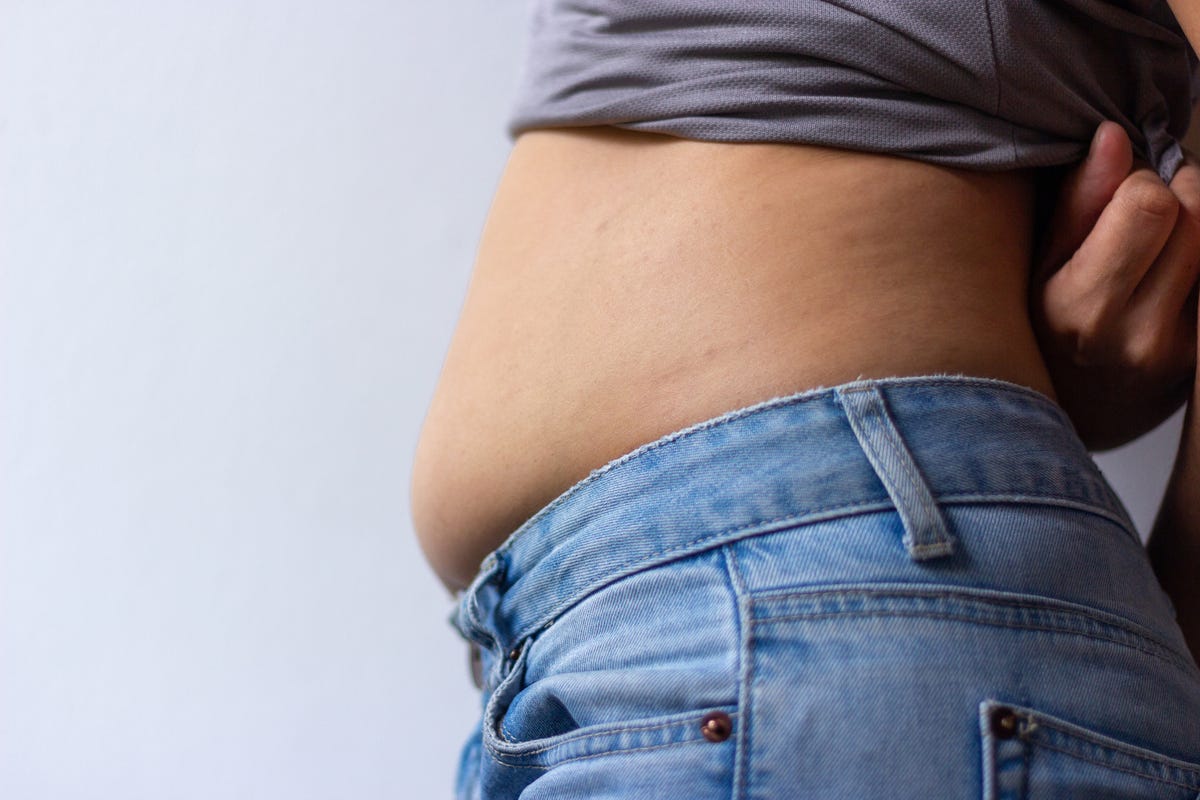When most people think of bloating, they picture an uncomfortable fullness after a meal or a swollen belly that won’t go away. It’s easy to assume that any form of bloating is a problem or something to be avoided. But before you stress over every little change in your stomach, it’s important to understand that bloating is not always a sign of trouble. In fact, some amount of bloating is normal for many of us.
If the main reason you’re worried about bloating is that you want to have a flatter stomach around the clock, you might be chasing an unrealistic goal. On the other hand, if your bloating is accompanied by other digestive symptoms, it could be a sign of an underlying issue.
No two people are exactly the same. But for many of us, bloating throughout the day or month is a totally routine occurrence. I, for example, tend to get a visible food baby by the end of the day. For a long time, I felt ashamed of that post-meal bloat and found myself sucking in, hiding it or avoiding the mirror. But thanks to dietitians and wellness influencers who are working to normalize bloating, I’ve learned to shake off the shame, tune into my own body and learn what’s “normal” for me.
I chatted with a registered dietitian nutritionist and a family doctor to find out the truth about bloating, and when you should be concerned. Here’s what to know.
What is bloating?

Bloating refers to a swollen, tight or full feeling in the abdomen. In everyday usage, “bloating” is used to describe a wide range of causes for a larger-than-usual belly.
Gaby Vaca-Flores, registered dietitian nutritionist and founder of Glow+Greens, says that “bloating, in most cases, is perfectly normal.” As your food is digested into smaller pieces, some types of foods ferment and release gas, she explains: “Under normal circumstances, ‘food babies’ are simply made up of intestinal gas.” As the digestion process continues, the bloating goes down.
“After eating a meal we all get a degree of bloating,” explains Dr. David Beatty, who’s worked as a general practitioner for over 30 years in England. Because of the way your bones and muscles are shaped, the front and sides of the belly are most likely to stretch and distend to make room for the extra volume after you eat or drink, Dr. Beatty says.
But if bloating is so common, why does it have such a negative connotation? “Bloating can change the size and shape of your stomach,” Vaca-Flores says. “I think this temporary change in appearance can be upsetting since we often see healthy people depicted as having a flat-looking stomach. The good news is that bloating happens to everyone and it’s perfectly normal for our body’s appearance to fluctuate throughout the day.”
What causes bloating?

Many people assume that bloating must be caused by some sort of health issue, but in most cases, it’s just part of digestion, Vaca-Flores says. Still, why do some people bloat more than others, and why do you only bloat at certain times?
Common causes of bloating include:
- Eating or chewing quickly
- Eating a large meal
- Bubbly drinks
- Not enough water or fiber
- Hormonal changes (e.g. your menstrual cycle)
- Stress
- Some medications
However, bloating is one symptom of certain health issues. It’s important to know the difference between normal, everyday bloating and the type of bloating that may be associated with a health condition so that you can get the right treatment.
Normal vs. abnormal bloating

Like with other unrealistic beauty standards, people on social media have worked to dismantle the idea that bloating is inherently bad by sharing photos of their stomachs before and after they eat, or during their periods.
One content creator, @claraandherself on TikTok, has built a 1-million-strong follower base, thanks in large part to her viral “outfits before and after I eat” videos.
“If I’m totally honest with you, I only have abs in the morning,” an Instagram influencer, @healthychefsteph, wrote in a post in 2017. “It’s natural. Don’t punish yourself for it.”
One common refrain on social media is that the difference between normal and abnormal bloating is pain — if it doesn’t hurt, it’s nothing to worry about. But the truth isn’t quite that simple, Vaca-Flores says, because pain is a subjective experience. “Some people might describe the abdominal pressure from normal bloating as painful whereas others might say it’s uncomfortable,” she says. “Similarly, people with underlying health conditions may experience bloating that is constant, but not painful.”
A better way to identify abnormal bloating is by looking for other accompanying symptoms. This type of bloating usually occurs alongside at least one other symptom, like nausea, diarrhea or constipation, Vaca-Flores explains. Also, keep track of when and how often you experience bloat. “People with digestion-related health conditions are likely to experience bloating at most meals,” she says.
Some health conditions that may contribute to bloating include:
- Irritable bowel syndrome
- Inflammatory bowel disease
- Gastroesophageal reflux disease, also known as GERD
- Celiac disease
- Other food sensitivities or intolerances
- Constipation
Dr. Beatty emphasizes that more serious health conditions can also result in a bloated abdominal area, including ovarian cysts, uterine fibroids and swelling of the liver, spleen, kidneys or lymph glands. If you experience continuous bloating that doesn’t come and go, it’s important to see a doctor. “This is more likely to be due to one of the more serious causes,” Dr. Beatty says.
Even if your bloating is caused by a health condition, that’s no reason to beat yourself up about what it looks like, any more than you would beat yourself up about getting a headache. Bellies simply change shape, and that’s OK.
How to prevent bloating

Regardless of how you feel about your bloat, you should never avoid eating just to avoid bloating.
Instead, try these management techniques for prevention, courtesy of Dr. Beatty.
- Eat with your mouth closed
- Increase physical activity to help speed up digestion
- Avoid drinking fizzy drinks and chewing gum
- Eat the most gas-producing foods, like beans, lentils and cruciferous vegetables, in moderation
- Try probiotics in moderation
- Eat more frequent, smaller meals and snacks
- Manage your stress levels
How to get rid of bloating

“Usually, normal bloating can be relieved with common remedies like taking digestive enzymes, drinking warm beverages and walking,” Vaca-Flores says. “Nevertheless, passing gas and having a bowel movement should help bloating go away within a few hours.”
If these remedies aren’t working for you, a healthcare provider can assist you with finding a more effective and reliable solution. Be wary of using over-the-counter “detox” supplements to address bloating — many of these products have a laxative effect and are potentially dangerous to use over time.




















+ There are no comments
Add yours